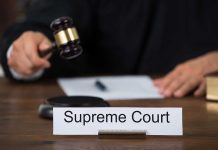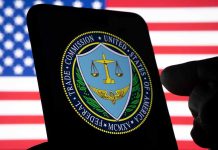
Justice Neil M. Gorsuch has recused himself from a Supreme Court case involving a Utah railroad project, raising questions about judicial ethics and conflicts of interest.
At a Glance
- Justice Gorsuch recused from a case that could benefit billionaire Philip F. Anschutz.
- Recusal follows pressure from ethics watchdogs and Democratic lawmakers.
- Case involves environmental regulation impact on projects like oil drilling.
- Gorsuch’s decision cites new Supreme Court code of conduct.
- Recusal highlights broader concerns about judicial ethics in the Supreme Court.
Gorsuch’s Unexpected Recusal
In a surprising turn of events, Supreme Court Justice Neil M. Gorsuch has stepped back from a significant case involving a Utah-based railroad project. The case, which could potentially benefit billionaire Philip F. Anschutz, has brought attention to the ongoing debate about judicial ethics and conflicts of interest within the nation’s highest court.
The Supreme Court clerk announced Gorsuch’s recusal in a memo, stating it was “consistent with the code of conduct.” This marks the first time a Republican-appointed justice has publicly cited the new code in a recusal decision, according to Gabe Roth of Fix the Court.
The Case and Its Implications
The case in question revolves around whether the National Environmental Policy Act (NEPA) requires federal agencies to consider “downline impacts” of projects such as oil drilling. Anschutz’s oil and gas company has filed a friend-of-the-court brief against the environmental regulation, claiming it imposes “absurd requirements” that could cause “significant harms to the project developers and the economy.”
Gorsuch’s ties to Anschutz date back to the early 2000s when he represented the billionaire as a corporate lawyer. Their relationship extended beyond professional bounds, with Anschutz playing a role in Gorsuch’s federal appeals court nomination and the two forming a joint property venture.
Pressure for Recusal
The recusal follows mounting pressure from ethics watchdogs and Democratic lawmakers. Representative Hank Johnson and colleagues sent a letter demanding Gorsuch’s recusal, citing Anschutz’s influence on Gorsuch’s career and their personal ties.
Johnson praised Gorsuch’s decision to recuse, emphasizing the importance of maintaining public trust in the Supreme Court’s integrity. However, some critics argue that the recusal came only after the conflict was brought to light.
“To show the American people that the Supreme Court is impartial, you must recuse yourself from any case that directly impacts the financial fortunes of Philip Anschutz, the man who was your previous legal client, who helped raise you to the Supreme Court, and who now treats you to lavish vacations on his exclusive 60-square-mile ranch” – Democratic Representative Hank Johnson
Broader Implications for Judicial Ethics
Gorsuch’s recusal occurs amid broader scrutiny of Supreme Court ethics, following revelations about Justice Clarence Thomas’s undisclosed gifts from billionaire Harlan Crow. The Supreme Court adopted its first code of conduct in November 2023, but it lacks an enforcement mechanism beyond voluntary compliance.
The incident has reignited calls for greater transparency and enforceable ethical standards at the Supreme Court. As the highest court in the land, the Supreme Court’s integrity and impartiality are crucial to maintaining public trust in the judicial system. Gorsuch’s recusal, while a step in the right direction, highlights the ongoing need for clearer guidelines and stronger enforcement mechanisms to address potential conflicts of interest among Supreme Court justices.
Sources:
- Justice Neil Gorsuch Recuses From Case That Could Benefit Colorado Billionaire
- Supreme Court Justice Neil Gorsuch Recuses Himself From Case After Pressure










